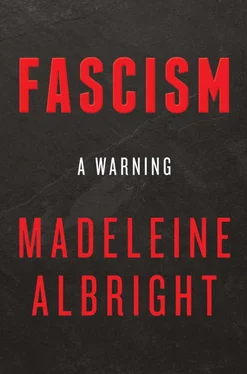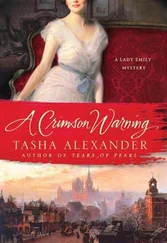As that day of reckoning drew near, Henlein shed earlier disavowals and embraced Nazism, salute and all. His disciples differed from those of Hitler only in the color of their shirts (white) and the design of their banners (scarlet with a white shield, no swastika). In September 1938, the clash between Nazi lies and the rule of law came to a head; the lies won. Under the 1938 Munich Pact, France and Great Britain agreed that Germany was justified in gobbling up 30 percent of Czechoslovak territory, a third of its population, and more than half of its strategic minerals. Less than six months later, Hitler returned for the rest.
CONTROVERSY OVER FASCISM’S RISE, DIRECTION, AND FATE TRANSCENDED the boundaries of Europe. Though the word “Aryan” tends to conjure up the image of a blue-eyed Nordic blond, some pro-Nazi racial theorists traced its origins to “the people that descended, several millennia ago, from the Central Asian plateau into the valleys of the Indus and Ganges and who remained pure by observing strict caste laws…. These people call themselves the Aryans… the noblemen.”
Many in India endorsed this designation. Angry at their British overlords and worried about Muslim encroachment, Hindu nationalist leaders admired Mussolini’s attempt to turn easygoing Italians into a warlike people; they yearned for a similar transformation among their own followers. In March 1939, ten days after the Wehrmacht’s invasion of Czechoslovakia, spokesmen for the Hindu Party hailed Germany’s “revival of the Aryan culture,… her patronage of Vedic learning, and the ardent championship of the tradition of Indo-Germanic civilisation.” During the Second World War, thousands of militant Hindus found their way to Germany, where the Nazis organized them into a legion to fight British forces on the subcontinent.
The forces that nourished Fascism elsewhere—economic hardship, ambition, and prejudice—were present, too, in the United States. A self-educated writer, William Pelley, founded the Silver Legion of America in January 1933, only a few hours after Hitler’s ascension to the chancellorship of Germany. Headquartered in Asheville, North Carolina, the Legion attracted a membership of some fifteen thousand. Followers wore blue pants and silver shirts with a scarlet “L” over the heart, standing for Love, Loyalty, and Liberty. The Silver Shirts were militantly anti-Semitic and sought to duplicate the Nazi model of organizing armed bands. Undercover investigators from the U.S. Marine Corps testified that Pelley’s operatives promised them money in exchange for access to weapons from military arsenals in California, but the inquiry did not lead to arrests. In 1936, Pelley ran for president on the slogan “Down with the Reds and Out with the Jews,” but was on the ballot only in Washington State and received fewer than two thousand votes.
The Silver Shirts soon disappeared, but the prejudice they espoused found a voice in such organizations as the Ku Klux Klan and in the nationwide broadcasts of Father Charles Coughlin, a polarizing and isolationist radio personality based in Detroit. Not every bigot was the same, however, for although many of those with Fascist tendencies were anti-immigrant, others had not been in the United States for very long.
Nearly a quarter of the United States population had some German ancestry and most of them hoped that a second war between their native and adopted homelands wouldn’t be necessary. Within this group were some, a small fraction, who declared their support for Hitler. Fritz Kuhn was such a man. A chemical engineer who came to the United States in 1928, Kuhn organized the German American Bund (GAB) eight years later. Members of the group wore brown shirts and black boots, and displayed the swastika at rallies alongside a portrait of George Washington, whom they hailed as America’s “first Fascist” because of his alleged distaste for democracy. “Just as Christ wanted little children to come to him, Hitler wants German children to revere him”—this was the message conveyed at the Bund schools that sprouted around the country, most commonly in the Midwest.
The Bund fully expected a National Socialist victory in Europe and saw a chance to copy that anticipated triumph on U.S. shores. To bring that goal closer, the GAB demanded full obedience from members and urged the United States to remain neutral in any dispute involving Germany and the Allied powers. Despite their foreign roots, Bund enthusiasts portrayed themselves as the truest and purest Americans, defending the country against such perils as Communism, miscegenation, and jazz. The movement reached a rowdy climax at Madison Square Garden in February 1939, when Kuhn spoke to an amped-up crowd of twenty thousand. To shouts of “ Sieg Heil ,” he gleefully mocked President Frank D. “Rosenfeld” and his “Jew Deal.”
The GAB encountered stout opposition from mainstream German-American organizations, trade unions, Jewish activists, and at least a few gangsters. “The stage was decorated with a swastika and a picture of Adolf Hitler,” recalled notorious mob boss Meyer Lansky of one Fascist rally. “The speakers started ranting. There were only fifteen of us, but we went into action. We threw some of them out the windows. Most of the Nazis panicked and ran out. We chased them and beat them up. We wanted to show them that Jews would not always sit back and accept insults.” Given the connection with the underworld, it seems appropriate that the career of Fritz Kuhn ended not in an act of violence but—as with Al Capone—in a prison sentence for tax evasion and, in Kuhn’s case, an added conviction for embezzling GAB money to support a mistress.
In hindsight, it is tempting to dismiss every Fascist of this era as a thoroughly bad guy or a lunatic, but that is too easy, and by inducing complacency, also dangerous. Fascism is not an exception to humanity, but part of it. Even people who enlisted in such movements out of ambition, greed, or hatred likely either were unaware of, or denied to themselves, their true motives.
Oral histories from the period testify to the hope and excitement that Fascism generated. Men and women who had despaired of political change suddenly felt in touch with the answers they had been seeking. Eagerly they traveled long distances to attend Fascist rallies, where they discovered kindred souls keen to restore greatness to the nation, traditional values to the community, and optimism about the future. Here, in this crusade, they heard explanations that made sense to them about the powerful currents that were at work in the world. Here were the chances they had sought to participate in youth groups, athletic organizations, charity drives, and job-training activities. Here were the connections they needed to start a new business or take out a loan. Many families that had stopped after bearing two children, thinking that number all they could afford, now found the confidence to bear four or five or six. In the congenial company of fellow Fascists, they could share an identity that seemed right to them and engage in a cause that each could serve with gladness and singleness of heart. These were prizes, they believed, worth marching for and even giving up democratic freedoms for—provided their leaders could do as promised and make their fantasies real.
For a long while, it appeared that those leaders could do exactly what they pledged. Throughout the 1920s, Mussolini had the look of a winner, and so, after 1933, did Hitler. They—more than any other European statesmen—were trusted to deliver where conventional politicians fell short. They were the trailblazers, the visionaries firmly in touch with the disturbing yet exhilarating zeitgeist, the spirit of the time.
In Cabaret , there is an electrifying moment at a beer garden when a young Nazi rises to his feet and, joined by most but not all of those present, belts out an anthem of promise and horror:
Читать дальше
Конец ознакомительного отрывка
Купить книгу












